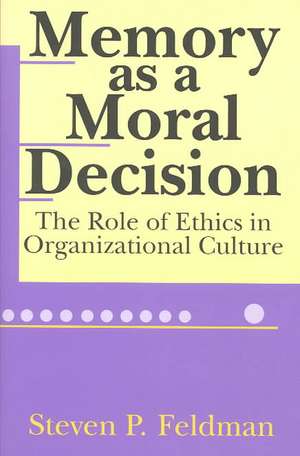Memory as a Moral Decision: The Role of Ethics in Organizational Culture
Autor Steve Feldmanen Limba Engleză Paperback – 28 feb 2004
Preț: 297.15 lei
Preț vechi: 340.37 lei
-13% Nou
Puncte Express: 446
Preț estimativ în valută:
56.86€ • 59.52$ • 47.33£
56.86€ • 59.52$ • 47.33£
Carte tipărită la comandă
Livrare economică 31 martie-14 aprilie
Preluare comenzi: 021 569.72.76
Specificații
ISBN-13: 9780765805867
ISBN-10: 0765805863
Pagini: 249
Dimensiuni: 152 x 229 x 20 mm
Greutate: 0.34 kg
Ediția:1
Editura: Taylor & Francis
Colecția Routledge
Locul publicării:Oxford, United Kingdom
ISBN-10: 0765805863
Pagini: 249
Dimensiuni: 152 x 229 x 20 mm
Greutate: 0.34 kg
Ediția:1
Editura: Taylor & Francis
Colecția Routledge
Locul publicării:Oxford, United Kingdom
Cuprins
Part 1: Introduction 1. The Chain of Memory: On the Relations Between Moral Culture, the Individual, and the Past 3 Part 2: Establishing Traditions 2. The Disinheritance of Management Ethics: Rational Individualism in Barnard’s The Functions of the Executive 37 3. The Ethics of Shifting Ties: Moral Relativism in Melville Dalton’s Men Who Manage 57 Part 3: Ethical Rationalism 4. Management Ethics Without the Past: Rationalism and Individualism in Critical Organizational Theory 83 5. Micro Matters: The Aesthetics of Power in NASA’s Flight Readiness Review 109 Part 4: Ethical Relativism 6. The Revolt Against Cultural Authority: Power/Knowledge as an Assumption in Organization Theory 7. Playing with the Pieces: Deconstruction and the Loss of Moral Culture 155 8. The Leveling of Organizational Culture: Egalitarianism in Critical Postmodern Organization Theoiy 181 9. Conclusion: Sanctuaries Against the Modem World 203
Descriere
The notion of organizational culture has become a matter of central importance with the great increase in the size of organizations in the twentieth century and the need for managers to run them




